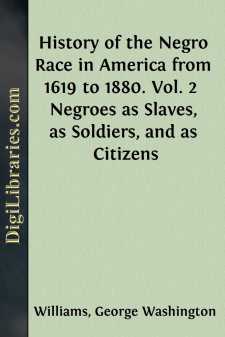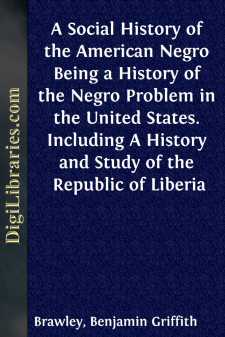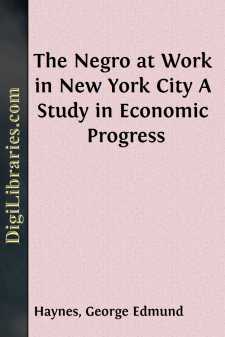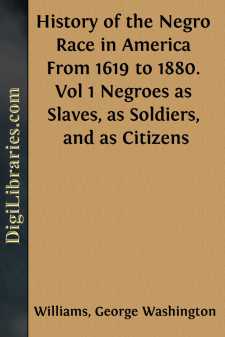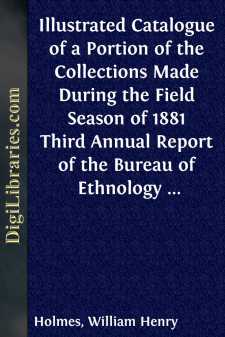History
- Africa 30
- Americas (North Central South West Indies)
- Ancient 68
- Asia 58
- Australia & New Zealand 8
- Canada 41
- Caribbean & West Indies 1
- Civilization 20
- Eastern Europe 12
- Europe 310
- Expeditions & Discoveries 60
- General 77
- Historical Geography 1
- Jewish 9
- Latin America 3
- Medieval 8
- Middle East 13
- Military 248
- Revolutionary 8
- Study & Teaching 5
- United States 353
- Western Europe 56
- World 13
Americas (North Central South West Indies) Books
Sort by:
CHAPTER I. 1800-1825. Commencement of the Nineteenth Century.—Slave Population of 1800.—Memorial Presented to Congress calling Attention to the Slave-trade to the Coast of Guinea.—Georgia cedes the Territory lying West of her to become a State.—Ohio adopts a State Constitution.—William Henry Harrison appointed Governor of the Territory of Indiana.—An Act of Congress prohibiting the...
more...
CHAPTER I THE COMING OF NEGROES TO AMERICA 1. African Origins An outstanding characteristic of recent years has been an increasing recognition of the cultural importance of Africa to the world. From all that has been written three facts are prominent: (1) That at some time early in the Middle Ages, perhaps about the seventh century, there was a considerable infiltration of Arabian culture into the...
more...
PREFACE This study was begun as one of the several researches of the Bureau of Social Research of the New York School of Philanthropy, largely at the suggestion of Dr. Samuel McCune Lindsay, the director, to whose interest, advice and sympathy its completion is largely due. Sincere thanks are due the Bureau for making the investigation possible. The material was gathered between January, 1909, and...
more...
CHAPTER I HOW SLAVERY GREW IN AMERICA An English traveler, riding along the banks of the Potomac in mid-July, 1798, saw ahead of him on the road an old-fashioned chaise, its driver urging forward his slow horse with the whip, until a sharp cut made the beast swerve, and the chaise toppled over the bank, throwing out the driver and the young lady who was with him. The traveler—it was John Bernard, an...
more...
CHAPTER I. THE UNITY OF MANKIND. The Biblical Argument.—One Race and One Language.— One Blood.—The Curse of Canaan. DURING the last half-century, many writers on ethnology, anthropology, and slavery have strenuously striven to place the Negro outside of the human family; and the disciples of these teachers have endeavored to justify their views by the most dehumanizing treatment of the Negro....
more...
Industrial Education for the Negro By BOOKER T. WASHINGTON, The necessity for the race's learning the difference between being worked and working. He would not confine the Negro to industrial life, but believes that the very best service which any one can render to what is called the "higher education" is to teach the present generation to work and save. This will create the wealth from...
more...
by:
William J. Smyth
MOUND-BUILDERS By Rev. William J. Smyth, M.A., B.Sc., Ph.D. When the early settlers began to pioneer the unbroken forests of North America, they considered the various Indian tribes to be the true Aborigines of this continent. But long before the red man, even long before the growth of the present forests, there lived an ancient race, whose origin and fate are surrounded with impenetrable darkness. The...
more...
CHAPTER I THE CONTINENT IN PRE-SPANISH DAYS The discovery of South America stands as one of the most dramatic events in history. From the time of its occurrence until the present so deeply has this event impressed itself on men's minds that the previous state of the Continent has been a somewhat neglected topic. The Incas and their civilization, it is true, have attracted no small share of...
more...
INTRODUCTORY. Mr. Palmer began his explorations early in July, 1881, and continued with marked success until the end of the year. He first paid a visit to the Cherokee Indians of North Carolina, and collected a large number of articles manufactured or used by this people, besides a number of antiquities from the same region. From Carolina he crossed into Tennessee, and began work by opening a number of...
more...
INTRODUCTION. BY PROF. W. H. CROGMAN. I am requested to write an introduction to this volume of essays, written by representative men and women of the Negro race and touching almost every phase of the Negro question. Certainly it is a hopeful sign that the Negro is beginning, with some degree of seriousness, to turn his eyes inward, to study himself, and try to discover what are his possibilities, and...
more...


